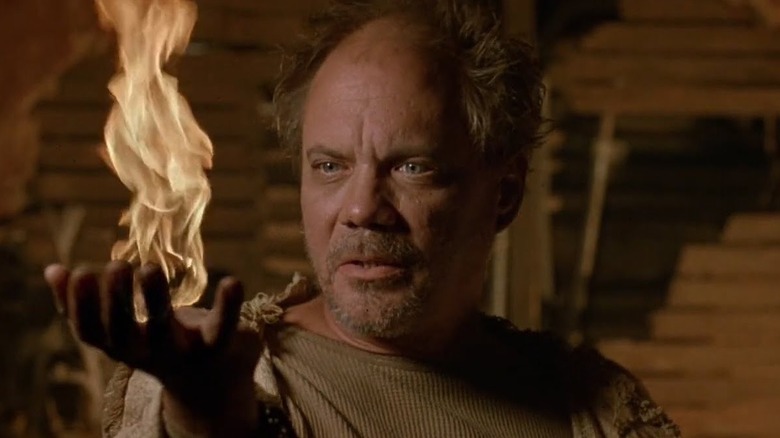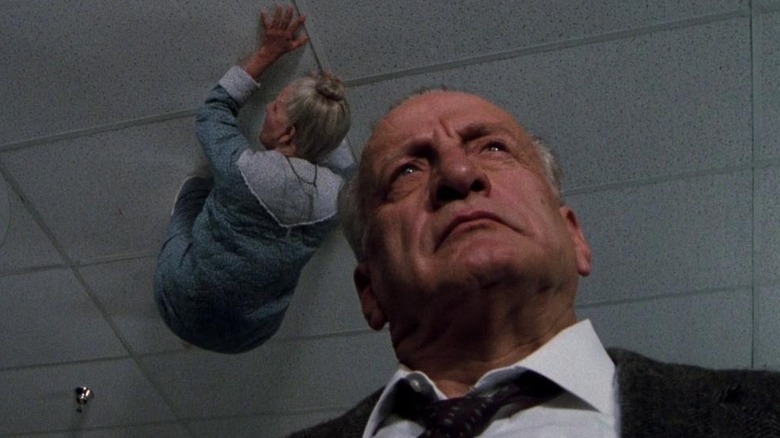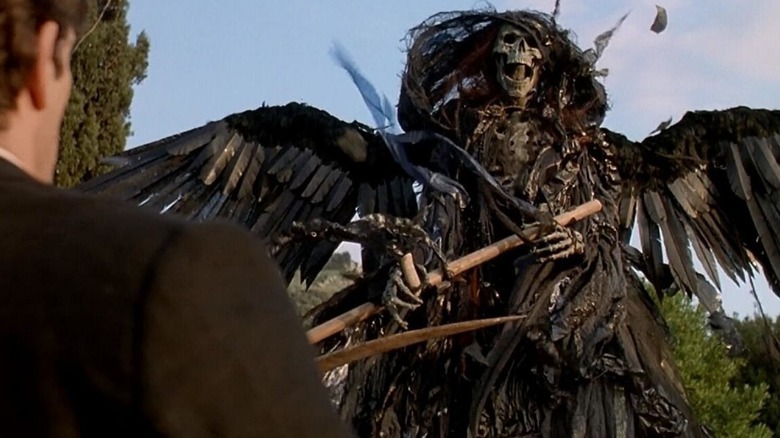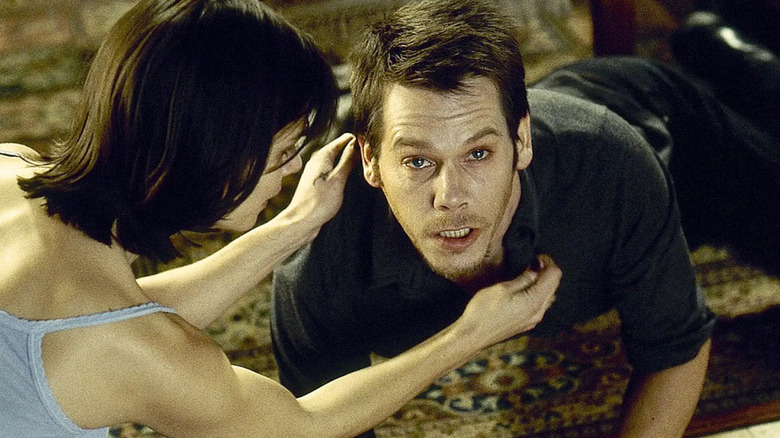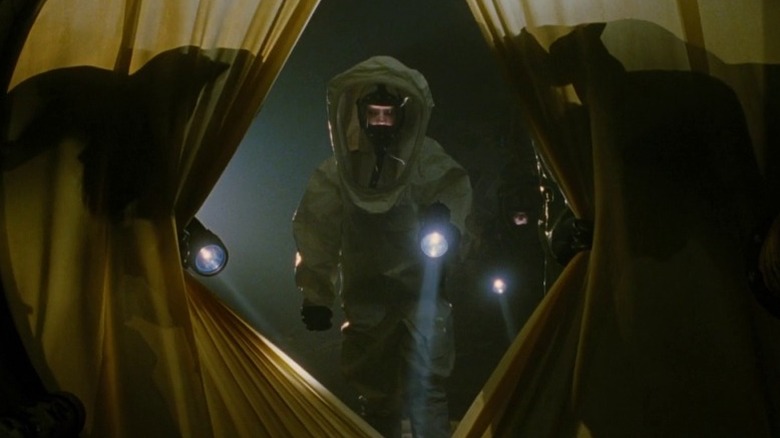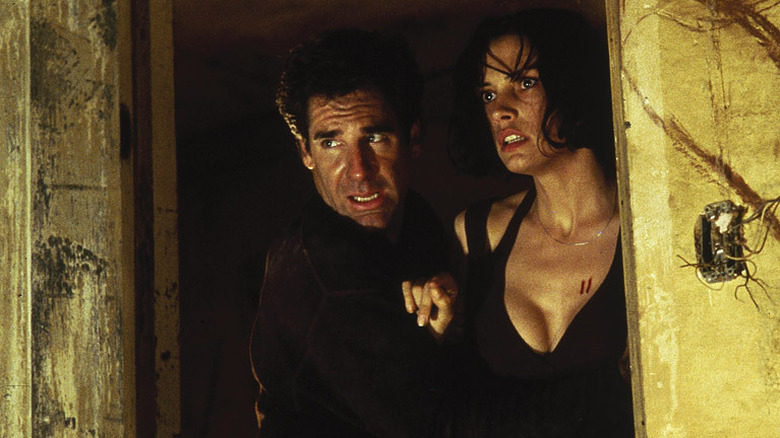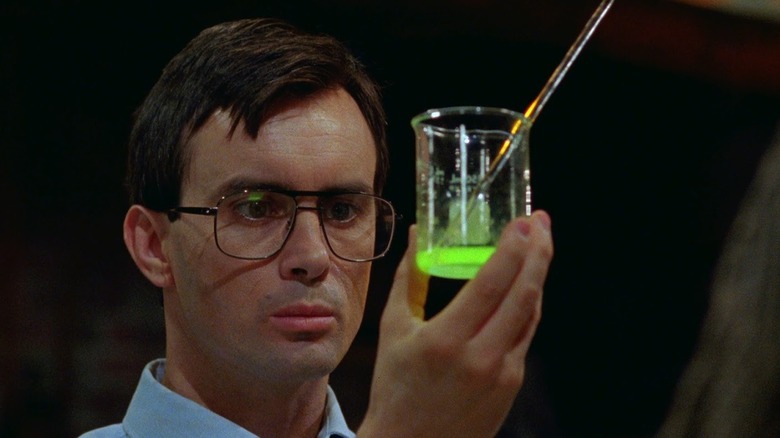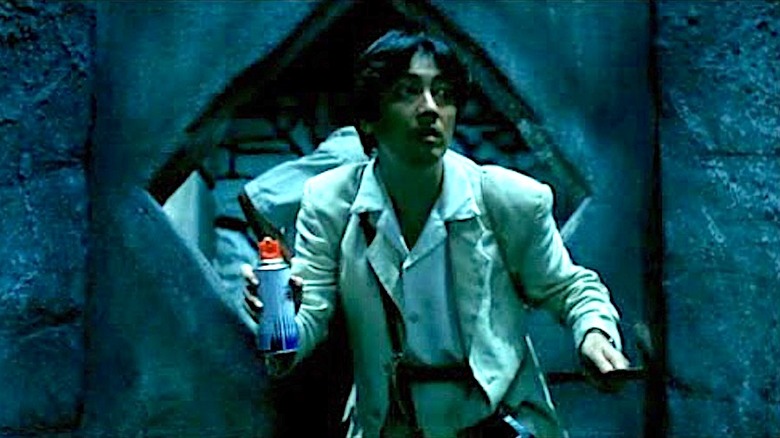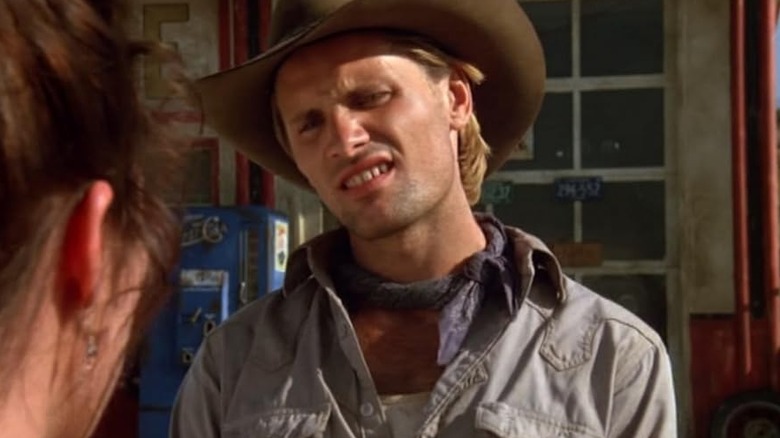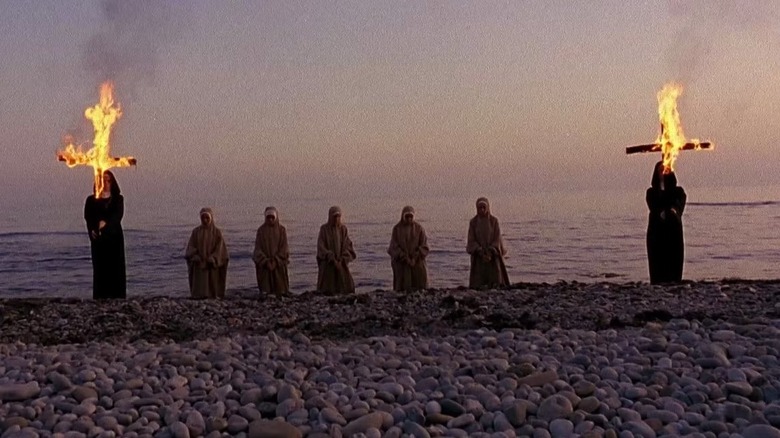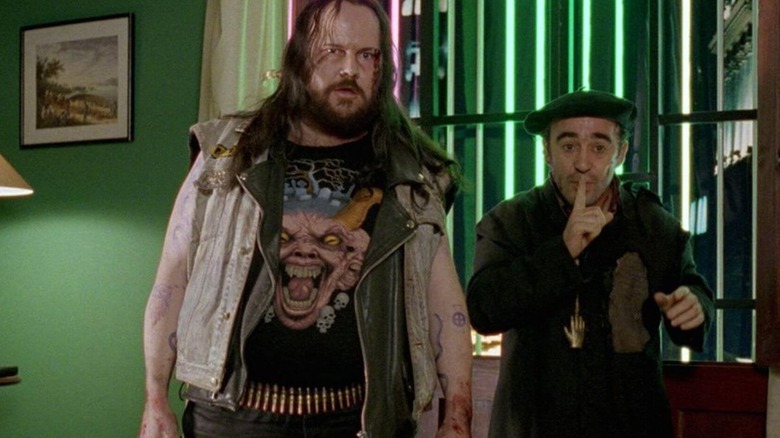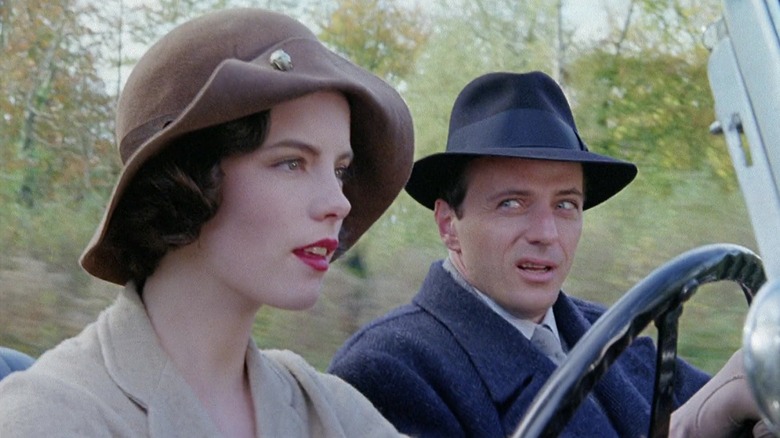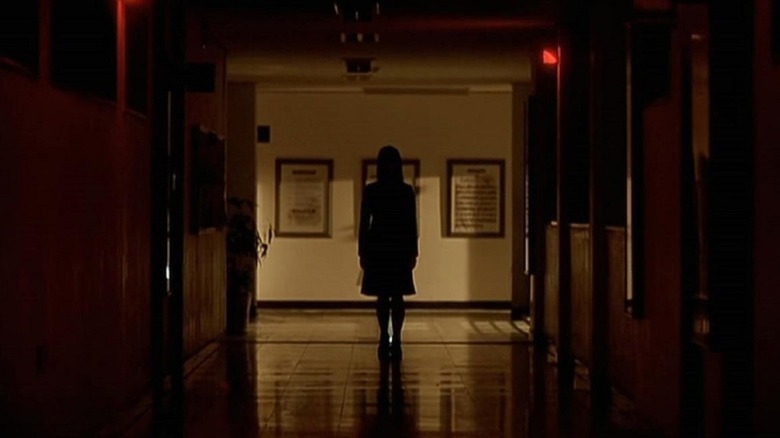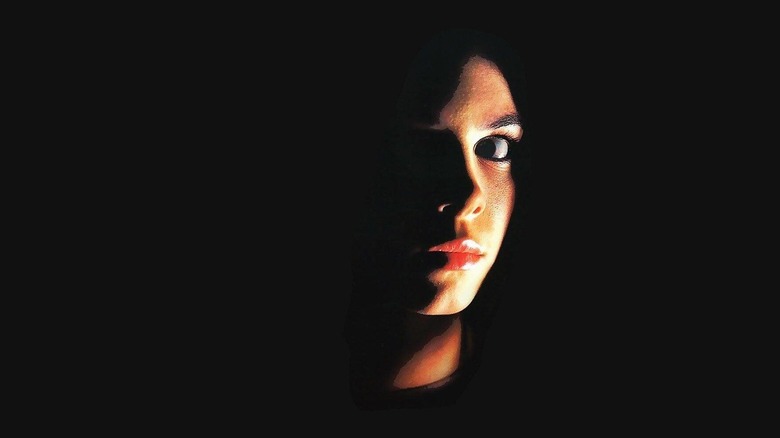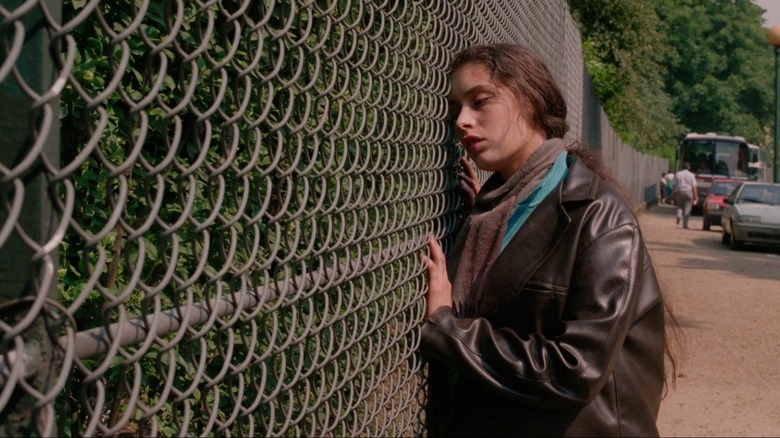Underrated '90s Horror Movies You May Have Forgotten Existed
While it seems that most movies fit into one of two categories — hits or flops — there are hundreds, if not thousands of films that simply fall through the cracks and fade from audiences' attention. It's often through no fault of their own: some films earn glowing reviews but fail to generate box office heat, or they're overshadowed by blockbusters, or they simply aren't good (or bad) enough to hold a place in our collective memories. All genres have their "sleepers," and horror is no exception. A cross-section of horror titles from the past 100 years will turn up forgotten, must-watch retro horror movies, half-remembered monster movies, and even entire decades of underrated, underappreciated horror movies.
Following is a list of horror movies from the 1990s, all very different in terms of story, tone, and approach, but with one linking element: each movie seems to have failed to find an audience during its release, but deserves one now.
The Exorcist III
As the directors of "Exorcist: The Beginning," "The Exorcist: Believer," and other films in the ever-expanding franchise spawned from William Friedkin's 1973 horror film might tell you, it isn't easy to follow up what is regarded as the best horror movie of all time. Even William Peter Blatty, who won an Oscar for adapting his novel for Friedkin's film, had trouble bringing his follow-up novel, "Legion," to the screen. Test audiences decried the lack of supernatural elements in a film billed as a sequel to "The Exorcist," which spurred producers at Morgan Creek to add Jason Miller as Father Damien Karras, as well as an exorcism and a new title, "Exorcist III." That helped sell tickets but not with the critical response or Blatty's frustration with the project.
A version of Blatty's "Legion" cut surfaced in 2016 on a Shout! Factory Blu-ray release of "Exorcist III," and while neither version is on par with the '73 "Exorcist," they certainly aren't disasters. "Legion" is a police drama with George C. Scott investigating murders linked to Regan McNeil's exorcism, while "Exorcist III" makes the connection explicit. The exorcism scene also can't compare to its predecessor, but both versions have very creepy moments — Mrs. Clelia crawling on the ceiling, a long shot of a hospital corridor that ends in violence — and nerve-rattling performances by Brad Dourif and Miller as various vessels for an evil entity. "Exorcist III"/"Legion" holds its own, despite its famous predecessor.
Cemetery Man
The Italian horror-comedy "Cemetery Man" earned excellent reviews during its release in 1994; Variety, referencing its Italian title, wrote, "'Dellamorte Dellamore' is a deceptively easy genre picture with hidden depths." Michele Soavi's feature, inspired by the Italian horror comic "Dylan Dog," starred Rupert Everett as a lovelorn caretaker whose pursuit of romance is upended by a constant stream of zombies that emerge from his cemetery. Its absurdist humor and gory effects won over critics and international audiences, but landed with a thud in America, where it grossed less than $254,000.
It's possible that the film's tone shifts from broad humor to gruesome violence may have confused viewers, as did its bizarre non-ending. Those looking for straight-ahead zombie action won't find it here. But in the ensuing decades, "Cemetery Man" has slowly built a cult following from fans who appreciate its cool, off-kilter perspective and Soavi moving zombies out of purely shoot-them-in-the-head territory and into fresh and funny directions. "As philosophically rich and sensually aware as it is filled with zombie-blasting mayhem, ['Dellamorte Dellamore'] is truly unlike any other film in European cinema," wrote Mondo Digital.
Stir of Echoes
Though a modest hit in 1999, writer-director David Koepp's "Stir of Echoes" isn't the supernatural horror film that most people think of when they consider the genre at the end of the '90s. That decade was capped off with "The Sixth Sense," "The Mummy," and "The Blair Witch Project," all of which seem to be better remembered than "Stir of Echoes." That's not to say that it's a lesser film, because it's also a very different but still unsettling horror picture.
Based on a novel by legendary author Richard Matheson, "Echoes" stars Kevin Bacon as Tom Witzky, a working-class husband and father who discovers that, like Cole Sear in "The Sixth Sense," he can communicate with the dead. The power is newfound, arriving after he is hypnotized by his sister-in-law (Illeana Douglas), and delivers unsettling visions of a missing young girl (Jennifer Morrison). Spurred on by the girl's ghost, Tom begins investigating the circumstances behind her death, which link her to people in the community.
The scares in "Echoes" are memorable but also personal, and involve real feelings of fear and desperation. That is perhaps its most memorable element: beneath the ghostly trappings of the paranormal, there is always pain and loss.
Mimic
Guillermo del Toro's American feature film debut came with 1997's "Mimic," a science fiction-horror hybrid about a strain of human-sized insects that emerge from New York City's subway system to prey on people. What reads like the premise for a particularly silly B-movie is, in del Toro's hands, a straight-faced and frequently shivery thriller with a cautionary element about the insect world's ability to adapt, no matter how we attempt to eradicate them. Of particular note is the sleek cinematography by Daniel Lausten in his first of several collaborations with del Toro.
"Mimic" was apparently an unhappy shoot for del Toro, who reportedly clashed with Miramax chief Harvey Weinstein (prompting a near fistfight with James Cameron) and eventually lost control over the final cut. The film earned mixed reviews and did not find an audience during its theatrical run, netting just $25 million on a $30 million budget, but has since become a cult favorite, and even spawned two loosely related sequels. Del Toro, who disowned the theatrical version, released a director's cut in 2011.
Lord of Illusions
Audiences hoping for a return to the wall-to-wall gore of "Hellraiser" after the fantasy elements of "Nightbreed" may not have known what to make of Clive Barker's third and, to date, final turn as director on "Lord of Illusions." A mystery-fantasy-horror hybrid based loosely on a story from his "Books of Blood Volume 6" collection, "Illusions" features Barker's occult detective Harry D'Amour (Scott Bakula), who is hired to protect a stage magician (Kevin J. O'Connor) who has been targeted by the leader (Daniel von Bargen) of a doomsday cult.
"Illusions" earned mixed to negative reviews (with some considering it among the worst Barker adaptations) and modest box office returns upon release in 1995, but it's worth re-examination as an ambitious and more successful attempt that "Nightbreed" to bridge Barker's interests in fantasy, thrillers, and horror.
Barker employs a capable cast which includes Famke Janssen in femme fatale mode and cult favorite Vincent Schiavelli, crafts a believably terrifying villain in von Bargen's Nix, and delivers a wealth of impressively gruesome effects and suspenseful setpieces. Unfortunately, studio interference again upended his vision: MGM required more than 12 minutes of cuts to emphasize the horror elements. However, a director's cut was released on Blu-ray in 2014.
Bride of Re-Animator
As with several films on this list, "Bride of Re-Animator" suffered in part because it was considered a lesser sequel to a popular horror film — in this case, 1985's ultra-gory "Re-Animator," considered one of the best movies based on an H.P. Lovecraft story. For its 1991 sequel, producer Brian Yuzna took over as director, but couldn't bring "Bride" to the same heights of gruesome body horror and black humor as its predecessor. "'Bride of Re-Animator' is less a sequel to the critically praised [original] than a rehash," wrote the New York Times.
And yet, "Bride" does, at times, approximate the lunacy of "Re-Animator." It wisely brought back Jeffrey Combs and Bruce Abbott as mad scientist Herbert West and sidekick Dan Cain, respectively, as well as David Gale as West's nemesis, Dr. Carl Hill, whom fans recall was reduced to an angry severed head in the first film.
Much of the sequel centers around West's plan to re-animate body parts instead of corpses, which leads to some revolting yet hilarious special effects, including bat wings that allow Hill's head to fly. This culminates in a ghoulish scheme to revive Cain's girlfriend: the creation, played by Kathleen Kinmont as a '90s-era Bride of Frankenstein, is gross, weirdly funny, and a touch tragic, like "Bride of Re-Animator" itself.
Hiruko the Goblin
Japanese filmmaker Shinya Tsukamoto gained international attention in the late 1980s with visually assaultive, experimental films like "Tetsuo: The Iron Man" and "Tokyo Fist." Tsukamoto's early low-budget projects overflowed with manic energy that served as a reaction against the depersonalized world in which his characters lived and died, often in spectacularly gruesome ways. Tsukamoto shifted gears in 1991 for "Hiruko the Goblin," a supernatural thriller based on stories from Daijiro Morohoshi's "Yokai Hunter" manga.
But "Hiruko the Goblin" was a critical and box office failure upon its release, and remained unavailable in the United States until 2022. The primary complaint seemed to be that it hewed closer to a traditional horror film, with seemingly "normal" characters and a linear plot, unlike the freeform "Tetsuo." But "Hiruko" is, in its best moments, as chaotic and outrageous as any of Tsukamoto's films.
The core premise is simple — an archaeological dig releases the titular spirit, which turns a student (Megumi Ueno) into a malevolent severed head on scuttling spider legs. "Hiruko" is eventually swarming with such monsters, all given life through practical effects and stop-motion animation which evokes the cartoon energy of Sam Raimi and the nightmarish aliens of "The Thing" in one. If you're a fan of both films, "Hiruko the Goblin" is worth your time.
Leatherface: The Texas Chainsaw Massacre III
"Leatherface: The Texas Chainsaw Massacre III" isn't the bloodiest, the best, or even the worst title in the "Texas Chainsaw" franchise spawned by Tobe Hooper's landmark 1974 horror film. But the 1990 feature from director Jeff Burr isn't particularly well-liked, either: its Rotten Tomatoes metrics are a dismal 13% from reviews and just 30% from fans, due in part by ratings board trouble which forced the removal of many gory moments. But "Chainsaw III" does have its merits, which make it worth a look, even from skeptical horror devotees.
"Chainsaw III" follows the by-now standard plot of travelers who fall afoul of Leatherface and his cannibal family, which here include the decomposed Grandpa and several new siblings. One of them is played with gusto by Viggo Mortensen, who is a key reason to check out Burr's film; another is Ken Foree from 1978's "Dawn of the Dead," who plays a hard-as-nails survivalist. The script, by novelist David J. Schow, is filled with offbeat moments, including a scene in which Leatherface (R.A. Milahoff) is frustrated that the children's language tool he is using won't accept "food' as the correct word for "clown." "Chainsaw III" may have its failings, but it can also claim to be far more entertaining than the dismal 2022 Netflix reboot.
Dark Waters (1994)
It's very likely that you may not know this international production exists at all, much less have forgotten about it. Released in 1994, "Dark Waters" is a very strange, surreal thriller with British actress Louise Salter (now an award-winning film producer) traveling to an island convent to understand its connection to her late father. There, she discovers strange rituals, human sacrifices, and a locked closet that barely contains a loud and angry ... something.
Though apparently a challenging production due to language barriers and other issues, director Mariano Baino crafts a creepy, dreamlike take on elements from Lovecraft's mythology. The remote Russian and Ukrainian locations also provide an eerie, alien atmosphere — the sort of place where diabolical rites might have taken place for centuries. "Dark Waters" has been difficult to see in the United States, save for one Blu-ray release in 2017; however, cult label Severin Films released it as part of its sprawling folk-horror movie boxed set, "All These Haunts Be Ours."
The Day of the Beast
Even after 25 years, Alex de la Iglesia's "The Day of the Beast" retains its power to shock, amuse, and offend audiences. The 1995 Spanish-Italian production, about a priest, a professor, and a metalhead who commit a string of criminal and blasphemous acts in order to prevent the birth of the Antichrist, is fueled by a steady stream of cartoonish violence and pointed criticism of established religions. In its quieter moments, "Beast" is also a sweet, if entirely skewed comedy about finding common ground with people who seem like polar opposites. It's also a Christmas movie, though unlike any other before or after it.
"Beast," which won six Goya Awards — Spain's most prestigious cinema prize — introduced de la Iglesia to international audiences and led to a long and eclectic film career that included everything from outrageous horror-thrillers like "Perdita Durango" (with Javier Bardem) and English-language crime dramas such as "The Oxford Murders," to documentaries like "Messi" and television series like "30 Coins." "Beast" remains one of de la Iglesia's most outrageous efforts, and required viewing for fans of his wide-ranging output.
Haunted
If a complaint can be registered against 1995's "Haunted," it's that it represents an "old-fashioned" approach to ghost stories. It's a period piece, set in post-World War I England, where American parapsychology professor Aidan Quinn investigates claims by an elderly maid (Anna Massey) that the three siblings under her care are plagued by ghosts. Quinn's professor soon discovers that all is not as it seems between the siblings, played by Kate Beckinsale, Anthony Andrews, and Alex Lowe, and soon finds himself the ghosts' target.
"Haunted" came at the end of director Lewis Gilbert's long career, which included three James Bond films and the Oscar-nominated "Educating Rita." Those expecting elaborate special effects will be sorely disappointed, but horror viewers who appreciate slow-boiling suspense and Gothic atmosphere will appreciate Gilbert's steady hand and attention to detail. When "Haunted" gets scary, and it frequently does, it delivers a surprisingly grisly (but not graphic) story marked by murder and madness. A pre-fame Beckinsale is particularly effective as a young woman whose flighty behavior masks a truly diabolical nature.
Whispering Corridors
Something terrible stalks the halls of the Jookran High School for Girls, something far worse than the abusive teachers and cold-hearted cliques. The presence is a matter of record for the students and teachers, who all accept that the ghost of a former pupil lingers at the school. But when the most brutal teachers begin dying, a new hire digs deep into the school's history to determine who, or what, may be responsible.
A foundational entry in the wave of South Korean horror films that emerged as cultural restrictions were waived when the country's military dictatorship ended in 1987, "Whispering Corridors" sought to emulate the Japanese horror boom of the early 1990s. Many of the tropes popularized by films like "The Ring" are echoed here, especially the vengeful, dark-haired female spirit. But the heart-stopping scares in J-horror are traded for gloomy and unnerving atmosphere, though there are still jumpy moments and gruesome deaths.
Director/co-writer Park Ki-hyung also uses his film to criticize a broken school system and authoritarian regimes in general; the mix of commentary and thrills made "Whispering Corridors" one of the most popular South Korean films of 1998 and spawned five unrelated sequels between 1999 and 2021.
The Nameless
Look up 1999's "The Nameless" on Rotten Tomatoes and you'll see that the Spanish film has a miserable 20% rating from critics and 42% from viewers. But that's not an entirely accurate portrait. "The Nameless" does struggle at times with plot coherence, but it's also possible that the negative response is due to its unrelentingly dark tone and subject matter. The film, based on a novel by celebrated British horror author Ramsey Campbell, centers on a violent child murder and later encompasses a Satanic cult, a concentration camp doctor, an abusive ex-boyfriend, and matricide.
What sounds like a checklist of unpleasant ideas is handled skillfully by director Jaume Balaguero. Best known for "[REC]" — one of the best found footage horror films — and two of its sequels, Balaguero emphasizes atmosphere and emotion over gore, though there is plenty of the latter. And the film concludes with a devastating plot twist that will leave many viewers breathless. "Balaguero sets out to define evil — and he manages it in truly graphic yet glorious style," wrote Eye For Film.
Baby Blood
As outrageous premises go, it's hard to beat "Baby Blood." The 1990 French film concerns a pregnant woman (Emmanuelle Escourrou), abused by her circus owner husband, who encounters an alien creature that enters her body to assume control of her unborn child. Once inside, the creature demands constant nourishment in the form of human blood while also offering steady commentary on her behavior and its need for her help with an escape plan.
Escourrou finds no shortage of meals for her parasitic companion, and spends much of the movie completely covered in blood. Were it just a non-stop gorefest, "Baby Blood" would be instantly forgettable. But the relationship between the chatty alien and its host slowly begins to resemble a warped version of motherhood, with Escourrou putting her own needs behind that of her "baby." When it was released in America (as "The Evil Within"), audiences saw a dramatically cut version with one unique perk: the voice of the alien was provided by Gary Oldman. Both versions are now available on Blu-ray.
If you or someone you know is dealing with domestic abuse, you can call the National Domestic Violence Hotline at 1−800−799−7233. You can also find more information, resources, and support at their website.
